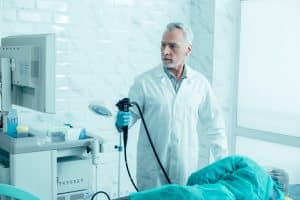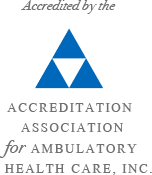What Can an Upper GI Endoscopy Detect?
 An upper endoscopy or EGD (esophagogastroduodenoscopy) is a simple procedure that gives our doctors a detailed view of your upper digestive tract. Performed using a small camera on a flexible tube, it can detect virtually any abnormalities in your esophagus, stomach, and the first part of your small intestine.
An upper endoscopy or EGD (esophagogastroduodenoscopy) is a simple procedure that gives our doctors a detailed view of your upper digestive tract. Performed using a small camera on a flexible tube, it can detect virtually any abnormalities in your esophagus, stomach, and the first part of your small intestine.
Your gastroenterology specialist should explain what they want to look for during your procedure when they order it. Here are just some of the conditions that can be identified during an upper GI endoscopy:
- GERD (gastroesophageal reflux disease) and Barrett’s esophagus: GERD happens when stomach acid flows backward into the esophagus. It is characterized by frequent and chronic symptoms such as heartburn, indigestion, and nausea. Left untreated, GERD can damage the esophageal lining and lead to a growth of abnormal cells called Barrett’s esophagus.
- Inflammation and ulcers: An upper endoscopy paired with a biopsy can detect different types of inflammation, including duodenitis, esophagitis, and gastritis. Inflammation alone is problematic, but it can also cause other issues like ulcers and erosion. Symptoms of inflammation or ulcers that may justify an upper endoscopy include nausea and vomiting, belching, burning stomach pain, and bloating.
- Esophageal stricture: An esophageal stricture is an abnormally tight or narrowed area of the esophagus. It can block the normal movement of food and liquids. Your doctor may recommend an upper endoscopy if you are experiencing symptoms such as trouble swallowing, shortness of breath, and chest pressure. Sometimes, your doctor can treat the stricture during this very same procedure.
- Cancer and tumors: Your doctor will look for unusual bumps, masses, and ulcers during an upper GI endoscopy. If they see one of these abnormalities, they will take a biopsy to find out if it is benign or malignant. An upper GI endoscopy may be recommended if you have risk factors or symptoms of upper GI cancer.
It is possible to receive the results of your upper endoscopy right away. However, if your gastroenterologist needs to collect a tissue sample during your procedure, there could be a several-day wait until you get the findings.
Schedule an Appointment with a NYC Gastroenterologist
If you think that you may require an upper endoscopy, schedule an appointment with one of the board-certified gastroenterology physicians affiliated with Gramercy Park Digestive Disease Center (GPDDC) at 212-979-3237. We serve patients from New York City and the surrounding areas of New York.


